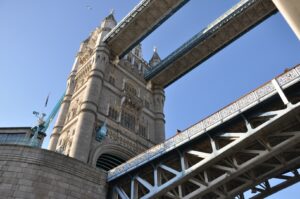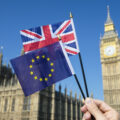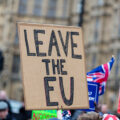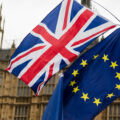Is the Brexit movement a religion? Part 6: Sacredness
Is the Brexit movement a religion? Part 6: Sacredness
The Brexit campaign relied upon values, institutions, and ideas considered ‘sacred’ by the British people. Our analyst Frazer MacDiarmid explores the similarities between the Brexit movement and religion.
This weekly comment was written by Frazer MacDiarmid and reflects his personal analyses and opinions, rather than those of EARS.
This mini-series has already looked at four out of the five characteristics that a religion exhibits, according to sociologist Ronald L. Johnstone.[1] These were a religion’s communal context, the body of beliefs, practices, and moral prescriptions associated with membership.
This article deals with the last and perhaps most interesting of Johnstone’s characteristics: that religions include ideas of the sacred. I briefly summarise Johnstone’s comments about sacredness here:
Religions sacralise certain objects or ideas, which are distinguished from the ordinary or profane. Sometimes (though not always), these sacred things are accorded a supernatural status, though adherents are always expected to treat them with “awe, reverence, and fear.” These often perform important functions in rituals.
Sacred politics?
‘Sacred’ is a powerful word. To call something sacred is to imply that it is priceless, non-negotiable, of ultimate importance. Amidst the deals, negotiations, and dirtiness of politics, ‘sacredness’ seems somehow misplaced.
But Brexit was more than politics, more than a dry policy decision. Brexit became an essential part of people’s identity, their sense of personal, community, and national pride. Many British people had great emotional investment in their side of the Brexit debate, which they supported through taking part in certain communal practices. Brexit also touched upon people’s beliefs, bringing into focus the principles, values, and institutions they believe to be bigger than themselves, or in a word: sacred.
Although there are many to choose from, this article examines three of these sacred figures.
The sacred ‘will of the people’
Shorthand for the fact that 52% of voters backed Leave, the ‘will of the people’ was often wielded by advocates of Brexit in their post-referendum battles. Sharper than a sword, the ‘will of the people’ could cut through problems of diplomatic, bureaucratic, or legalistic deadlock surrounding getting Brexit done. It could silence cries for a second referendum in a heartbeat.[2]
To say that one’s actions were carrying out the ‘will of the people’ was to immediately excuse the speaker from any doubt or criticism. It was a miracle cure for all manner of political ills. It provided politicians a wonderful immunity, since to attack them was to undermine the ‘will of the people’.[3] (Some politicians could discern in miraculous detail what the ‘will of the people’ was, despite the fact that the referendum question ‘the people’ answered was only 16 words long,[4] and Brexit is a notoriously complex idea.[5])
In other words, the ‘will of the people’ as a concept acquired a kind of sacred status. Theresa May was accused of invoking ‘the sacred “will of the people”’ in a bid to get her version of Brexit through parliament.[6] To profane the ‘will of the people’ was equal to blasphemy.
‘The Holy Grail’
Like Winston Churchill, the queen, and Yorkshire puddings, the National Health Service (NHS) is a beloved institution of British life. A 2018 poll found 87% of Brits were ‘proud’ of the NHS, ranking a close second to the Fire Brigade.[7] So important is the NHS to Britain that it is often described as its true ‘national religion’,[8] [9] [10] [11] [12] replacing the embattled official Anglican national churches (of which only 33% of people were proud).[13]
The NHS was front and centre of the Leave campaign. It was at the top of the list of reasons to vote leave on the Vote Leave website.[14] The famous ‘Brexit Bus’ we explored previously was emblazoned with the words: “We send the EU £350m a week: let’s fund our NHS instead.”[15]
Vote Leave spent more than £2.7 million placing political advertisements on Facebook.[16] Many of these mentioned the NHS, including: ‘Imagine if we gave £350m a week to our NHS instead of the EU!’[17] According to Brexiteers, Britain’s membership of the EU put the beloved NHS at great risk.[18]
According to two British scholars of politics, Vote Leave’s focus on the NHS was ‘a shrewd political calculation’.[19] As we have seen, the NHS has a kind of ‘mythical’ status in the imagination of the British public. Brexiteers ‘fram[ed] the NHS as the Holy Grail’, under ‘threat of the EU superstate and an influx of foreign migrants.’[20] Only Brexit could save this sacred institution from complete destruction.[21]
A cup of sovereignty
We have seen throughout this series how the leaders of the pro-Brexit campaign effectively created a religious mythology to try to promote their cause. Central to this mythology was the notion of ‘sovereignty’.
A poll taken on the day of the referendum found that half (49%) of Leave voters said that the biggest reason they voted for Brexit was “the principle that decisions about the UK should be taken in the UK” – in other words, that the UK should have sovereignty over its own affairs.[22]
Sovereignty has very obvious theological resonances. Religions talk about the ‘sovereignty of God’ over the world: God has absolute control and authority over his creation.[23] Prominent scholars of political theory have suggested that sovereignty is in fact a theological concept.[24] [25]
Populist and nationalist movements have often piggy-backed on theological concepts to give themselves the impression of divine importance or destiny.[26] Mark Francois, one of the spearheads of Brexit, spoke about the importance of ‘tak[ing] back full control of our national destiny.’[27] In the rhetoric of the Brexit campaign, ‘sovereignty’ and ‘taking back control’ became something of a sacred duty or calling, which all true British patriots would accept.[28]
Brexit, religion, sacredness
The Vote Leave campaign made a ‘shrewd political calculation’ to base their campaign around ideas and institutions that were effectively sacred to the British people, and sacralise others. This decision ultimately won the day, as a key Brexiteer admitted afterwards.[29]
This was part of a wider religious, even mythological, narrative that motivated people to vote for Brexit. A narrative in which a divinely-chosen people must be saved from demonic migrant and European elite forces, which are polluting the nation’s purity.
In our next and final article, we will draw together the religious threads that make up the Brexit campaign, and look more closely at the mythological narrative it was based upon.
This weekly comment was written by Frazer MacDiarmid and reflects his personal analyses and opinions, rather than those of EARS.
Our team of analysts conducts daily research on religion and society. In the past month, the topics of tension, leadership, and image were trending. Find out their relationships on the EARS Dashboard.
[1] Ronald L. Johnstone, Religion in Society: A Sociology of Religion (Routledge, 2015), pp. 8-14.
[2] The ‘will of the people’ on Brexit was not fixed for all time in June 2016
[3] Eleftheriadis, P., ‘Constitutional illegitimacy over Brexit’, Political Quarterly 88:2 (2017), 182-88.
[4] What was the question in the EU referendum?
[5] Is Brexit the will of the people? The answer is not quite that simple
[6] Theresa May’s assumption of absolute power over Brexit spells disaster
[7] The NHS is the British institution that Brits are second-most proud of – after the fire brigade
[8] The NHS, our National Religion
[9] The NHS is our religion: it’s the only thing that saves it from the Tories
[10] Clapping for the NHS, our new religion
[11] The NHS is the closest thing we have to a religion – and that’s why it must be privatised
[12] The NHS has taken over the church as the UK’s national religion
[13] The NHS is the British institution that Brits are second-most proud of – after the fire brigade
[15] Boris’s big red Brexit bus should have said £350,000,000 a year for NHS – not a week
[16] Vote Leave’s targeted Brexit ads released by Facebook
[17] Kettell, S., & Kerr, P., ‘The Brexit Religion and the Holy Grail of the NHS’, Social Policy and Society 20:2 (2021), 290.
[18] EU referendum: Sturgeon accuses Johnson of telling £350m ‘whopper’
[19] Kettell, S., & Kerr, P., ‘The Brexit Religion and the Holy Grail of the NHS’, Social Policy and Society 20:2 (2021), 291.
[20] Kettell, S., & Kerr, P., ‘The Brexit Religion and the Holy Grail of the NHS’, Social Policy and Society 20:2 (2021), 291.
[21] Leave camp turned Brexit into a religion to capture votes, study finds
[22] Lord Ashcroft Polls: How the United Kingdom voted on Thursday… and why
[23] Sovereignty of God in Christianity
[24] Schmitt, C., Political Theology: Four Chapters on the Concept of Sovereignty. Trans. George Schwab (Cambridge, MA: MIT Press, 1985).
[25] Van Duffel, S., ‘Sovereignty is a theological concept’, The Monist 90:1 (2007), 126-43.
[26] Arato, A., ‘Political theology and populism’, Social Research, 80:1 (2013), 143-72.
[27] Mark Francois, House of Commons Debate, 29 March 2017.
[28] Kettell, S., & Kerr, P., ‘The Brexit Religion and the Holy Grail of the NHS’, Social Policy and Society 20:2 (2021), 291-292.
[29] Dominic Cummings: how the Brexit referendum was won: ‘Would we have won without £350m/NHS? All our research and the close result strongly suggests No.’






